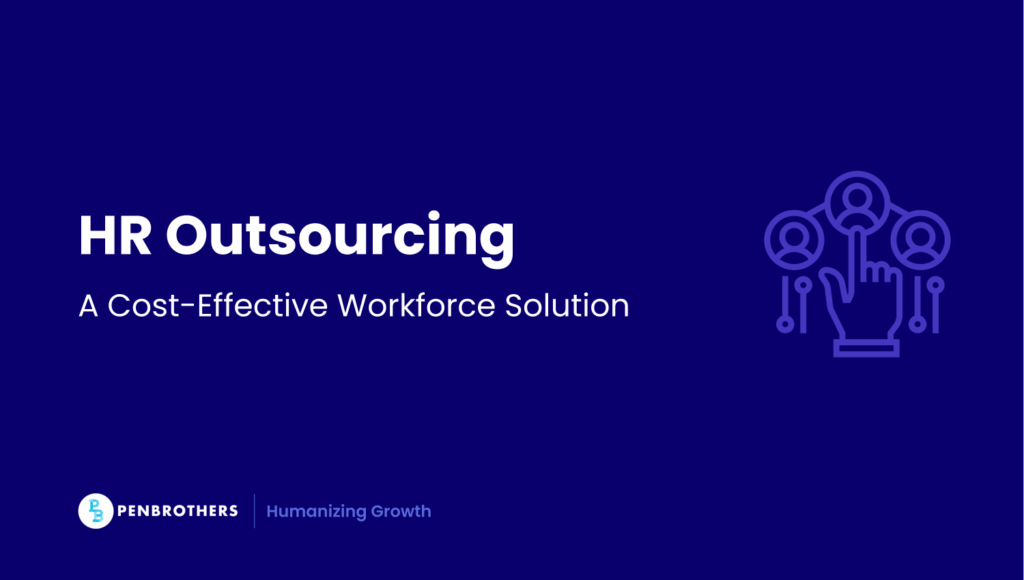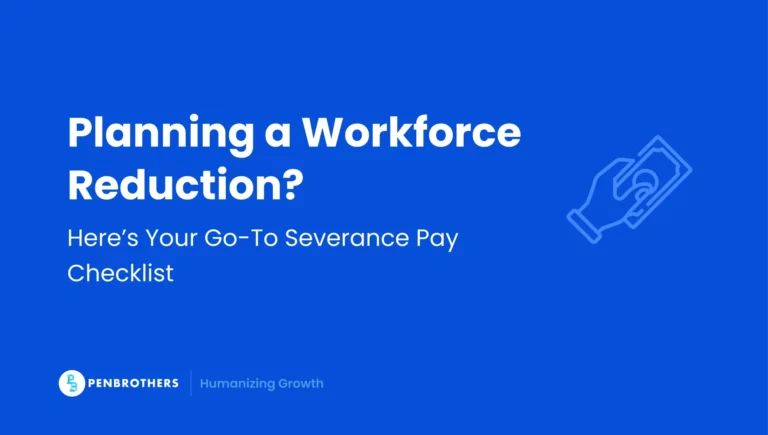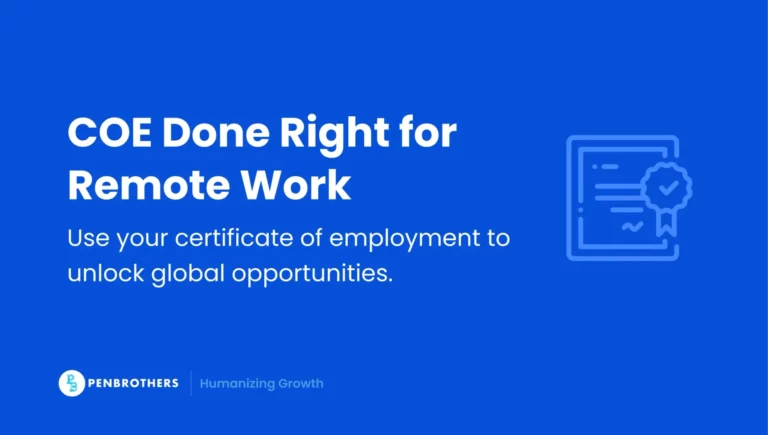Human Resource Outsourcing (HRO) is transforming how businesses manage their workforce. By delegating HR tasks to specialized external providers, companies can reduce overhead costs and enhance operational efficiency. In today’s competitive landscape, startups, SMEs, and large enterprises alike face the challenge of balancing growth with the administrative burdens of HR functions. Outsourcing HR offers a strategic solution to this dilemma.
Beyond cost savings, HRO provides access to expertise, ensures compliance, and offers agility in a rapidly changing business environment. With global competition intensifying, companies must evaluate whether maintaining in-house HR functions is the most effective use of resources.
Key Takeaways
- A Strategic Tool for Efficiency and Focus: Human Resource Outsourcing (HRO) allows companies to reduce significant overhead costs, improve operational efficiency, and free up leadership to focus on core business growth instead of administrative burdens.
- Access to Expertise and Enhanced Compliance: A primary benefit of HRO is gaining access to specialized HR knowledge. This ensures the business stays compliant with complex and ever-changing labor laws, which is critical for mitigating legal and financial risks.
- A Wide Range of Functions Can Be Outsourced: Companies can delegate a comprehensive suite of HR tasks, including operational functions like payroll processing and benefits administration, as well as more strategic areas like talent acquisition, performance management, and training.
- A Hybrid Model is the Smartest Approach: While HRO has potential downsides like a loss of personal touch and cultural misalignment, these are best managed with a hybrid model. The recommended strategy is to keep core functions like company culture and senior employee relations in-house while outsourcing the transactional and administrative tasks.
What Is HR Outsourcing (HRO)?
HRO involves partnering with external firms to manage various HR functions, such as payroll, recruitment, and compliance. Unlike Professional Employer Organizations (PEOs), which act as co-employers, HRO allows businesses to retain full control over their employees while outsourcing administrative tasks. This flexibility makes HRO an attractive option for companies aiming to scale without incurring excessive overhead.
To understand how businesses benefit from outsourcing, read about real-world success stories that highlight growth and efficiency improvements.
Why Is HR Outsourcing Growing?
- Increased Investment: According to Deloitte’s 2024 Global Outsourcing Survey, 80% of executives plan to maintain or increase their investment in third-party outsourcing.
- Focus on Core Capabilities: The same survey reveals that 50% of executives utilize outsourced services for front-office capabilities, including sales, marketing, and R&D.
- Adoption of Outcome-Based Services: 67% of executives have shifted to outcome-based services, moving beyond traditional staff augmentation in favor of results-driven relationships.
To stay updated on offshoring trends and outsourcing market developments, check out the latest insights.
Key HR Functions That Can Be Outsourced
Many businesses outsource these essential HR areas:
- Payroll Processing – Ensuring accurate, timely payments and tax compliance. Payroll errors can lead to costly penalties and employee dissatisfaction, making outsourced payroll services an effective way to improve efficiency and mitigate risks. Learn how payroll outsourcing works and its impact on businesses.
- Benefits Administration – Managing employee benefits, health insurance, and retirement plans. HR outsourcing providers stay updated on regulatory changes and benefits trends, ensuring companies offer competitive packages without administrative burdens.
- Talent Acquisition & Recruitment – Finding, screening, and onboarding top talent. Outsourcing recruitment shortens hiring timelines and provides access to global talent pools, reducing time-to-hire and improving the quality of hires. Read about the challenges of talent acquisition and how outsourcing can solve them.
- Compliance & Risk Management – Navigating complex labor laws and avoiding legal pitfalls. By outsourcing compliance management, businesses can stay ahead of labor law changes, avoiding fines and reputational risks.
- Performance Management & Employee Engagement – Tracking performance and enhancing workplace culture. HR outsourcing firms offer analytics and engagement tools that help businesses measure employee satisfaction and productivity in real time.
- Training & Development – Upskilling employees through professional learning programs. An outsourced HR partner can provide customized training solutions that align with industry standards, fostering career growth and retention.
For an in-depth look at the advantages of offshore staffing, explore how companies are leveraging outsourcing to build high-performing teams.
Why Should Companies Consider HR Outsourcing?
1. Cost Savings & Efficiency
Outsourcing HR functions can lead to significant cost reductions. By partnering with external providers, companies can avoid the expenses associated with maintaining full-time HR staff and investing in HR technologies. This approach allows businesses to allocate resources more effectively, focusing on core operations that drive revenue. Companies outsourcing payroll can reduce costs by almost 70% in HR-related roles. Check out our salary calculator for a detailed comparison of different roles.
2. Access to HR Expertise
HR laws and regulations are continually evolving, making compliance a complex task. HRO providers employ specialized teams that stay updated on labor laws, benefits regulations, and industry best practices. Their expertise ensures that businesses remain compliant without the need for internal teams to master every regulation.
3. Improved Compliance & Risk Management
Employment laws are intricate, and non-compliance can result in severe penalties. HRO providers specialize in managing legal and regulatory issues, thereby reducing risks for businesses. An article from SHRM notes that many organizations outsource specialized HR functions due to the complexities involved in compliance.
4. Scalability & Flexibility
Business needs are dynamic, and HR outsourcing offers the flexibility to scale services up or down as required. A startup can begin with basic HR support and expand services as it grows, while a company facing a downturn can reduce HR functions without the complexities of layoffs.
5. Focus on Core Business Operations
Administrative HR tasks can be time-consuming, diverting attention from strategic initiatives. By outsourcing these functions, leaders can concentrate on activities that drive growth, innovation, and enhance customer experience.
What Are the Disadvantages of HR Outsourcing?
Let’s address some real problems.
Loss of personal touch tops the list. Your employees built relationships with internal HR. They knew who to call, who understood their history, who fought for them during reviews. Outsourced HR feels transactional. The empathy disappears when HR becomes a ticket system.
Cultural misalignment creates deeper issues than most anticipate. Your offshore HR team might execute policies perfectly but miss the subtle dynamics that make your company unique. They approve time off during critical project phases because they don’t understand your business cycles. They handle terminations without grasping the ripple effects through tight-knit teams. They implement performance reviews that clash with your collaborative culture.
Response time gaps frustrate everyone. When an employee has an urgent personal issue, waiting 24 hours for a response from an offshore team feels like abandonment. Time zone differences compound this. Your Singapore team needs immediate HR support, but your Philippine team won’t respond for hours. Critical decisions stall. Problems escalate. Trust erodes.
The data security risk keeps executives awake. Your employee data (salaries, performance reviews, personal information) now lives on external servers. Even with SOC 2 compliance and encryption, breaches happen. When they do, the liability remains yours while the damage spreads through your workforce. One leaked salary spreadsheet destroys years of carefully managed compensation equity.
Quality inconsistency emerges gradually. The sales team showed you their best HR professionals. Six months later, you’re working with junior staff who don’t understand your industry. They process payroll correctly but can’t handle complex equity compensation. They manage basic recruitment but struggle with technical role assessments. You get administrative competence without strategic capability.
The solution isn’t avoiding HR outsourcing. It’s structuring it strategically. Keep strategic HR internal—culture, senior recruitment, employee relations. Outsource the operational—payroll, benefits administration, compliance tracking. Build hybrid models where offshore teams support but don’t replace human connection. Maintain enough internal capability that you’re never helpless.
Potential Challenges and How to Overcome Them
1. Communication Gaps with External Providers
Outsourcing requires effective coordination. Poor communication can lead to misunderstandings and inefficiencies
Solution: Choose providers with dedicated account managers and establish clear service-level agreements (SLAs) to ensure alignment.
2. Hidden Costs and Contractual Complexities
Some providers may impose additional fees for services beyond the initial scope.
Solution: Thoroughly review contracts and ensure all costs are transparent before finalizing agreements.
3. Employee Resistance to Change
Employees might be concerned about losing personal HR support.
Solution: Facilitate a smooth transition by keeping employees informed, providing training on new HR platforms, and offering direct support channels.
How to Choose the Right HR Outsourcing Provider
Key factors to consider when selecting an HR outsourcing provider:
- Industry Experience – The provider should have expertise in your industry, understanding its unique HR challenges and regulatory requirements. A specialized provider ensures compliance and tailored HR strategies that align with industry best practices.
- Service Scope – The provider must be capable of managing all the HR functions your business requires, from payroll to compliance. A comprehensive service offering allows for seamless integration and reduces the need for multiple vendors.
- Cost Structure – Transparent pricing and competitive rates are essential to avoid hidden fees and unexpected costs. A well-structured cost model should align with your budget while delivering measurable value.
- Compliance Expertise – A reliable provider should have a proven track record of managing labor law compliance, reducing legal risks for your business. Their expertise should cover local, national, and international labor regulations to ensure full compliance.
- Technology & Support – The provider should offer modern HR technology that streamlines processes and improves accessibility for employees. Responsive customer support is also critical to addressing HR concerns efficiently and ensuring a smooth experience for your team.
Key Questions to Ask Potential Providers:
- What HR services do you specialize in?
- How do you ensure compliance with labor laws?
- What technology platforms do you utilize?
- Can you provide case studies or references?
- What is your pricing model, and are there hidden fees?
The Transition from In-House HR to Outsourced HR
Making the shift requires a structured approach:
- Assess Your HR Needs – Identify pain points and determine which functions to outsource. Evaluate which HR tasks are consuming excessive time and resources, and prioritize outsourcing those that can be handled more efficiently by an external provider.
- Select the Right Provider – Compare vendors, check references, and negotiate terms. Look for providers with a strong track record in your industry and ensure their service offerings align with your company’s long-term HR strategy. Read about building an effective offshore team for more insights.
- Define a Transition Plan – Set a timeline, train employees, and establish communication protocols. Ensure clear responsibilities are assigned during the transition, and implement change management strategies to help employees adapt smoothly.
- Implement in Phases – Start with payroll or benefits before moving to full outsourcing. This phased approach minimizes risks, allows for troubleshooting early challenges, and ensures that each HR function is integrated effectively.
- Monitor and Optimize – Regularly review the provider’s performance and adjust as needed. Schedule periodic evaluations, gather employee feedback, and work closely with the provider to fine-tune processes for maximum efficiency.
Evaluating the ROI of HR Outsourcing
Key performance indicators (KPIs) to measure the success of outsourcing include:
- Cost Reduction – Compare HR expenses before and after outsourcing. Evaluate savings on salaries, benefits, office space, and technology costs while factoring in the fees paid to the outsourcing provider to determine overall financial impact.
- Compliance Improvements – Track reductions in legal risks and penalties. Analyze whether the provider has helped maintain labor law compliance, reduced instances of payroll errors, or prevented costly fines due to regulatory violations.
- Time Savings – Measure administrative workload reduction. Analyze whether the provider has helped maintain labor law compliance, reduced instances of payroll errors, or prevented costly fines due to regulatory violations.
- Talent Acquisition Metrics – Assess improvements in hiring speed and quality. Assess how much time managers and HR personnel save by outsourcing repetitive or complex tasks, allowing them to focus on strategic initiatives that drive business growth.
- Employee Satisfaction – Use feedback to determine if HR services have improved. Compare pre- and post-outsourcing recruitment timelines, retention rates, and the overall quality of hires to determine if outsourced HR functions lead to better hiring outcomes.
HR outsourcing is a strategic advantage. It reduces costs, improves efficiency, ensures compliance, and helps companies scale with ease. Whether you’re a startup aiming for rapid growth, an SME managing expansion, or an international business entering new markets, HRO provides the expertise and flexibility needed to thrive.
The key is choosing the right provider and ensuring a seamless transition. Companies that leverage HR outsourcing effectively not only save money but also unlock new growth opportunities. Ready to explore HR outsourcing? Take the next step and discover how Penbrothers can help your business succeed.
Frequently Asked Questions
With a PEO, the provider becomes a co-employer of your staff. With HRO, you delegate specific HR tasks to an external firm but retain full legal control and employment responsibility over your team, offering greater flexibility.
The most common functions are typically those that are administrative and compliance-heavy. These include payroll processing, benefits administration, talent acquisition and recruitment, and compliance and risk management.
The primary risks include a loss of personal touch with employees, potential cultural misalignment between the provider’s processes and your company’s unique dynamics, response time delays due to time zone differences, and data security concerns related to sharing sensitive employee information.
A strategic hybrid model is the most effective way to mitigate risks. This involves keeping high-touch, strategic HR functions like company culture, senior recruitment, and complex employee relations in-house, while outsourcing the more transactional and administrative tasks like payroll processing and compliance tracking.
You should evaluate a provider based on five key criteria: their experience in your specific industry, the scope of services they offer, a transparent cost structure, their proven expertise in labor law compliance, and the quality of their technology platforms and customer support.






